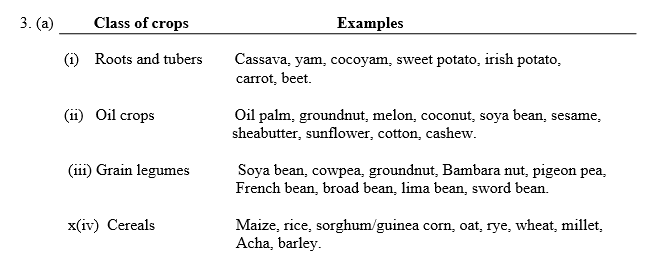Question 3
(a) Give two examples of each of the following classes of crops:
(i) roots and tubers;
(ii) oil crops;
(iii) grain legumes;
(iv)cereals. (8 marks)
(b) State five differences between the digestive system of a goat and a chicken. (5 marks)
(c) Give five reasons why farmers keep records. (5 marks)
Observation
Majority of candidates attempted this question but later found some of the sub-questions difficult.
- Candidates’ performance in this question was good but some candidates could not mention examples of grain legumes and confused oil palm with palm oil; groundnut with groundnut oil which made them lose marks.
- Question 3(b) was poorly attempted by candidates. They were unable to give corresponding differences between the digestive system of a goat and a chicken. This resulted in loss of marks.
- Only a few candidates were able to state reasons why farm records are kept. Many candidates were stating the importance of farm inventory, sales and production records.

(b) Differences between the digestive system of a goat and a chicken
(c) Reasons why farmers keep records
- Farm records when properly kept, provide the farmer with valuable information for future
budgeting and planning of the farm;
- Details of farm records are used for taxation/tax assessment;
- Farm records can enable the farmer to obtain loans from banks;
- Used for auditing the farm/farm evaluation;
- The records will enable the farmer to know whether his farm is progressing from one year to
another/strengths and weaknesses of the farm/credit worthiness;
- Help to detect fraudulent practices on the farm;
- Enable farmers to compare one enterprise to another on the same farm;
- Help in decision making;
- Show the history of business transactions of the farm.
